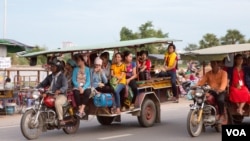Prime Minister Hun Sen on Sunday announced that the minimum wage for garment workers will rise to $168 next year.
He posted the remarks on his Facebook page shortly after attending an event along with thousands of garment workers in Phnom Penh.
“Because of political stability, good social order and foreign investment, the number of factories have increased continuously and given many jobs to Cambodian citizens,” he wrote.
He also urged employers to work with labor groups and workers to solve any disputes that arise, calling the often at-odds sides “life partners”.
The $168 monthly minimum wage is a $15 increase in the wage paid to the hundreds of thousands of garment workers this year.
Unions welcomed the prime minister’s pledge but said rising costs of living meant the wage was still too low.
Ath Thorn, president of the Cambodian Labor Confederation, said if the government could control inflation the wage would be more palatable, as current living costs were estimated to be about $200.
“If the wage increases but inflation keeps increasing I think it’s an issue because workers still have problems with their expenses,” he said.
Pav Sina, president of the Collective Union of Movement of Workers, said the figure fell short of the $171 demand made by labor groups but agreed with Thorn that if inflation was kept in check workers could manage.
In the run up to next year’s election, Hun Sen has regularly courted the garment worker vote, previously pledging to provide the workers free bus rides and subsidized health care.
Thorn said that despite Hun Sen’s promise of $168 per month, labor groups would still take part in trilateral wage negotiations scheduled for September.
Garment workers’ wages have increased dramatically since 2013 when the minimum wage was just $100 per month. The hikes followed the killing of at least five people by government forces during strikes in January 2014.
Kaing Monika, deputy secretary general of the Garment Manufacturers Association of Cambodia, could not be reached for comment.
However, on Friday she claimed that rising wages would mean “Cambodia will lose the chance to compete in the market.”







